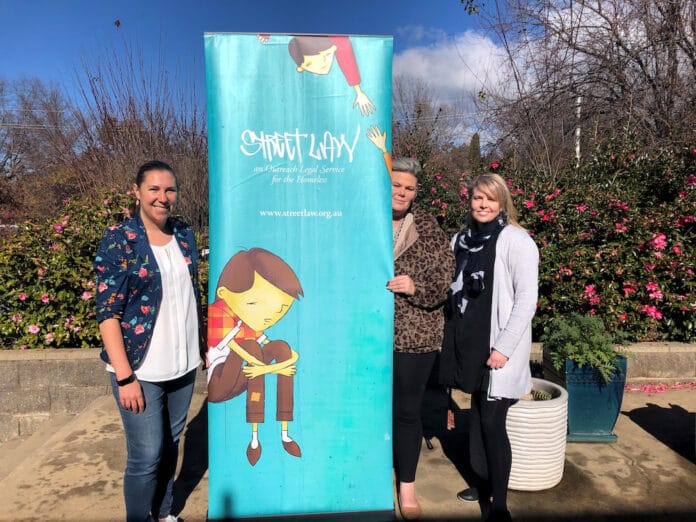
The Street Law program and McKillop House, a women’s shelter run by CatholicCare, have come together to provide free legal help for homeless women in the ACT.
The outreach program is a six-month pilot that officially started this week, on 26 May.
Solicitors from Street Law, a free and confidential legal service, will be visiting MacKillop House once a month to deliver information sessions focused on various topics including housing, Centrelink, consumer law, credit and debt matters, employment, minor criminal matters, obtaining identification documents, and other general civil law matters.
Lawyers will also be available after the session for women to talk about their individual legal problems with Street Law acting as a referral service where needed.
Michelle Barclay, a solicitor at Street Law, said nearly 60% of the people accessing ACT homeless services are women.
“When the general public think of homelessness, they think of rough sleepers, that is, people living on the streets,” she said.
“What many people don’t realise is that homelessness is quite broad and covers couch surfing, people living in their car, in crisis accommodation and refuges or overcrowded houses.”
Josh Vaughan, director of Youth, Mental Health, Homelessness & Family Services at CatholicCare Canberra & Goulburn, said the outreach program at McKillop House will offer an opportunity for women to seek legal advice and support that they may need now or into the future.
“Our priority is to ensure our residents receive holistic care whilst with us,” he said.
“Education and advice in navigating the legal system is an area that can cause a great deal of stress and anxiety for anyone, particularly those in crisis.”
According to homelessness statistics provided by Street Law, 53% of Canberrans living in low-income households are women and older single women are the largest growing cohort of homeless people in the ACT.
“Older women are more likely to lose home ownership or experience homelessness following the death of their partner, divorce or breakdown in a relationship,” Ms Barclay said.
“In general, women also have less superannuation and savings which makes it difficult to afford private rent.”
Ms Barclay said the main reason the Street Law program operates as an outreach service is because people in crisis are less likely to seek out the assistance of a lawyer.
“Many don’t even realise that they have a legal issue.”
Following the COVID-19 pandemic, both services have seen an increase in demand, with Street Law facing a 20% decrease in their capacity to deliver services from 1 July 2021.
Genevieve Bolton, executive director/principal solicitor of Street Law said when the pilot ends, they will need to look to future funding to keep the program going.
“Canberra Community Law is currently facing a funding crisis and it is important that our programs, including Street Law, receive ongoing funding so that we can continue to deliver free legal services to those most in need in the ACT,” she said.
For more information, visit www.canberracommunitylaw.org.au
For more:








